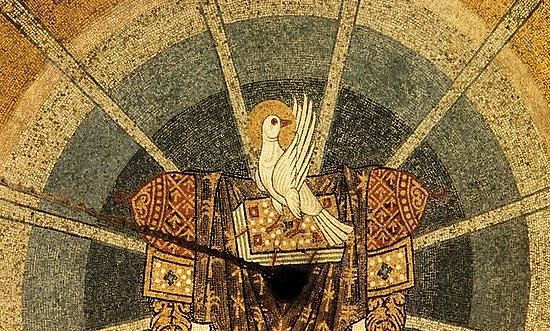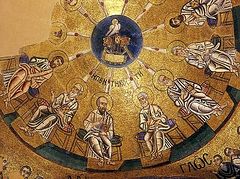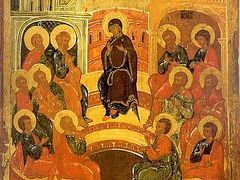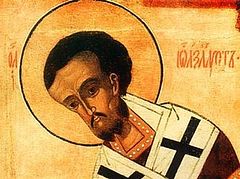Today (Sunday June 4th), we celebrate the Holy Feast of Pentecost. We celebrate the descent of the Holy Spirit upon the Disciples and Apostles of Our Lord Jesus Christ. But what about us? “How do we receive the Holy Spirit?” A basic study of this question may yield some surprising results. According to the book of Acts, baptism alone does not grant the gift of the Holy Spirit:
Now when the apostles who were at Jerusalem heard that Samaria had received the word of God, they sent Peter and John to them, who, when they had come down, prayed for them that they might receive the Holy Spirit. For as yet He had fallen upon none of them. They had only been baptized in the name of the Lord Jesus. Then they laid hands on them, and they received the Holy Spirit. (Acts 8:14–17)
The passage continues to reinforce the idea in the next verses: “And when Simon saw that through the laying on of the apostles’ hands the Holy Spirit was given, he offered them money, saying, ‘Give me this power also, that anyone on whom I lay hands may receive the Holy Spirit’” (Acts 8:18–19).
So, amazingly, we see that it wasn’t enough simply to be baptized. We also see the role of the sacramental priesthood in the work of the Apostles as they came to lay hands on the newly baptized. After the Apostles died, the teaching of the Orthodox Church is that a tradition was passed on from them to the bishops of the Church and this is the sacrament of chrism. Chrism (also known as myron) is a special oil of anointing that was originally blessed by the Apostles. In modern times, it is blessed only by the patriarchs or heads of the various Orthodox churches at specifically appointed times. It is also quite possible that St. John the Evangelist is speaking about this in his general epistle when he writes, “But you have an anointing from the Holy One, and you know all things” (1 John 2:20). A few verses later he also writes:
But the anointing which you have received from Him abides in you, and you do not need that anyone teach you; but as the same anointing teaches you concerning all things, and is true, and is not a lie, and just as it has taught you, you will abide in Him.
This anointing is spoken of throughout the early centuries of Christianity. Hippolytus, Roman priest (170–235), writes:
The neophytes are anointed by the presbyter from the oil consecrated by the bishop. He says, ‘I anoint you with holy oil in the name of Jesus Christ.’ (Apostolic Tradition 21–22)
Cyril, Bishop of Jerusalem (313–386), writes:
And to you in like manner, after you had come up from the pool of the sacred streams, there was given an Unction, the anti-type of that wherewith Christ was anointed; and this is the Holy Spirit. (Catechetical Lecture 21:1)
Basil, Bishop of Caeserea (330–379), one of the great figures of Christian history, has this to say:
We also bless the water of baptism, the oil of anointing, and even the baptized themselves. By virtue of what writings? Is it not by virtue of the protected, secret, and hidden tradition? Indeed! Even the oil of anointing, what written word has taught about that? The triple immersion, from where does it come? And everything that surrounds baptism: the renunciation of Satan and his angels—from what scripture does that come? Is it not from that teaching held private and secret, which our fathers kept in silence, protected from anxiety and curiosity, knowing well that in keeping quiet one safeguards the sacred character of the mysteries? For how would it be reasonable to divulge by writing the instruction, that which is not permitted to the uninitiated to contemplate? (On the Holy Spirit 15, 35)
Not only does St. Basil show us the teaching about the sacrament of chrism, but we also see him touch on the subject of holy tradition and why certain subjects are not “divulged by writings” but kept secret and safe from “the uninitiated,” that is, those who have not yet received Christian baptism.
It becomes clear from all of these passages that this sacrament of the early Christians has fallen out of practice in nearly every Christian denomination besides the Orthodox and the Roman Catholic (confirmation). God wants to bless our lives. This is the way that has been preserved for us from apostolic times. Our journey with the Lord Jesus Christ is fulfilled and blessed because we have received the Lord, the Holy Spirit and in this we have become like the Apostles on the day of Pentecost. On this joyous feast may we cleanse our hearts and humble ourselves and actively seek the guidance of the Lord, the giver of life who desires to unite our nature with His divine nature and to glorify us with the saints.
Glory be to God Forever AMEN.




